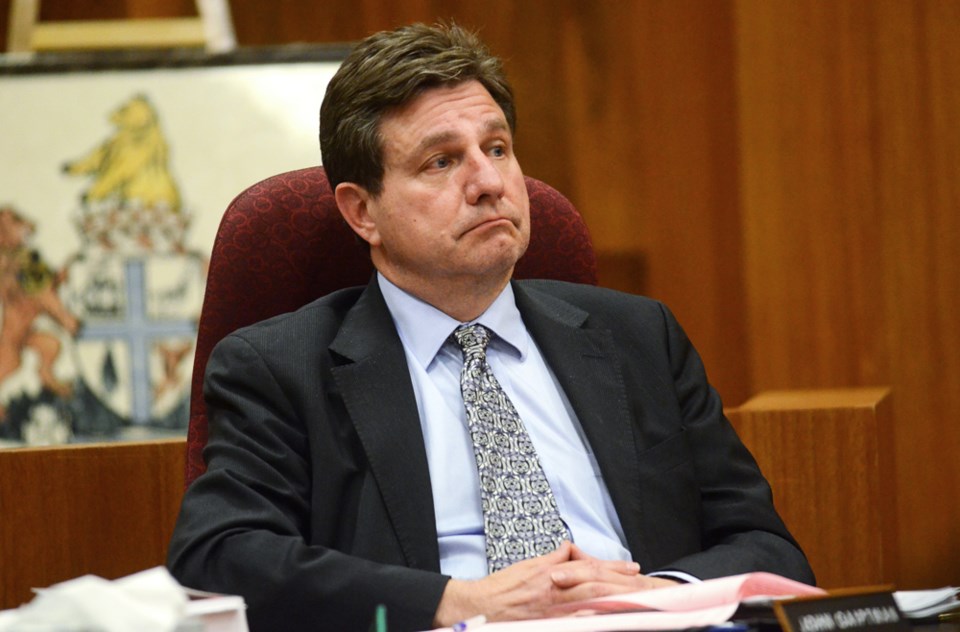New Westminster’s superintendent of schools has admitted to circumventing a school board bylaw at the inaugural meeting of the current school board in December – and he says he would do it again.
When the new board was sworn in six months ago, one of its first items of business, according to an existing bylaw, should have been to decide how much it would pay itself for the next four years.
But that item wasn’t on the agenda because superintendent John Gaiptman intentionally left it out.
“This is a total mea culpa on my part,” he told the Record, “but having that discussion about (the trustee stipend), when we haven’t had any preliminary discussions, to me didn’t make any sense.”
Gaiptman, a retired Victoria superintendent who was hired in February 2014 and has helped the board change and update 17 of its policies, said figuring out fair pay for trustees is complicated.
New West’s school district is comparable in size to Fort St. John’s, he said as an example, but the cost of living in each community is very different.
And he said linking trustee remuneration to school district size might not be fair anyway because larger districts could offer more staff support to make a board’s job easier.
Even something as straightforward as regular, automatic cost-of-living increases can get a board in trouble, Gaiptman said, if teachers or support staff go on strike, for example, and trustees still collect their regular raise.
Then there’s the matter of timing.
Given the current freeze on management salaries and the fact that School District No. 40 has only recently finalized a plan to pay down its $4.86 million debt, Gaiptman said trustees need as much information as they can get before voting on their own pay.
“On the other hand, if you don’t talk about it, you start to fall so far behind that you need to really get a big raise,” Gaiptman said.
New Westminster’s board hasn’t seen a pay increase since 2008, when a regular trustee’s remuneration before expenses jumped from $19,834 to $21,513, according statements of financial information on the district’s website. The vice-chair’s pay increased from $21,334 to $23,638, and the chair saw an increase from $22,834 to $23,888.
The board as yet to make a decision about its pay, but last month it struck an ad-hoc committee, comprised so far of trustees Kelly Slade-Kerr and James Janzen, to “review options and provide recommendations to the board on a process for setting the trustee stipend.”
No timelines have yet been set for that work.
Meanwhile, the bylaw Gaiptman ignored when putting together the agenda for the inaugural meeting in December has been changed.
In an overall update of the board’s rules of procedure, the section requiring the board to deal with the trustee stipend in the inaugural meeting was dropped.
The new rules were approved last month.
“If my process wasn’t what it should have been, I get it,” Gaiptman said of the omission on the inaugural meeting’s agenda. “I don’t want to sound like a psychopath, but I would have done it again. It’s not like I regret doing it.”
The outgoing board saw the agenda for the meeting, according to Gaiptman, but he said he bears sole responsibility for the omission.
In hindsight, however, chair Jonina Campbell said the board should have made a motion to refer the matter instead of going ahead with the meeting as per the agenda.
That being said, she said not dealing with the stipend at the inaugural meeting with no background information for trustees to go on was the best decision for the district.
“A lot of the things that we were doing in terms of our past practice weren’t always in our best interest,” Campbell said of the many policies that have been updated under Gaiptman’s leadership, “and this was one of them, and so (the superintendent) said, ‘Let’s look at this in a way where we don’t rush, where trustees have a lot of information, and they can consider options,’ and we’re doing that.”



